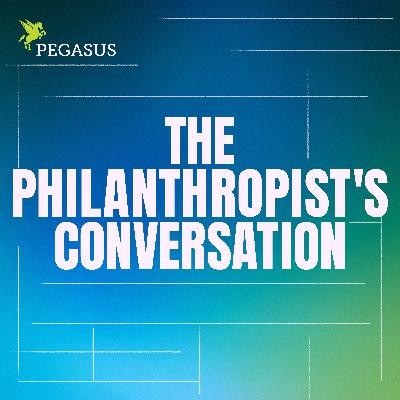The Philanthropist's Conversation
Subscribed: 0Played: 0
Subscribe
© Copyright 2026 Pegasus
Description
The world of tomorrow is full of questions. Are we prepared for another pandemic? How do we create smart cities that can withstand extreme weather events? What if artificial intelligence could mitigate climate risks? Would 2050 look different then? There’s no roadmap for the future, but if we want to embrace change, we need to have new conversations.
Introducing: The Philanthropist's Conversation, from Pegasus. In this show, we tackle the biggest challenges facing the world of tomorrow. We interrogate experts in sustainability, urban design, or government policy to dive into the hard questions and strive for resilience. Together, we tap into the power of social architecture, and build a new cultural discourse to navigate the road ahead.
For our first series, join us on a fictional journey around the world to talk about urban heat. The Philanthropist’s Conversation: Social Architecture to Address Urban Heat will break down what heat resilience looks like on the ground. Because our cities are getting hotter, and it’s going to impact our health, our transport, our politics… In short, every part of our environment.
This mini-series is based on documentary research in the field of heat resilience, and will answer important questions. Like: how do we currently handle urban heat? How do rising temperatures induced by climate change interact with our lived environment? What efforts are underway to get organized, and adapt our cities to global warming? What does the future of urban development and architecture look like, when we open new pathways to heat resilience?
Across four episodes, we follow our fictional host, Paula, around London, Paris, New York and Doha to find out how to live better with heat. We discuss how urban heat is going to transform our lives, and cover topics such as: social architecture and city planning; grey, blue and green infrastructures; the future of heat technology; urban heat strategies and environmental policy; and much more.
From our social systems and our climate, to our individual power of action, The Philanthropist’s Conversation opens a dialogue to get you keyed into new areas of research, innovation and philanthropy. Because that’s what Pegasus is all about.
A new entity from Tse Foundation, Pegasus is focused on social architecture; a movement that aims to connect environmental design to social behavior, to shape and improve our communities, at the micro and the macro level.
So whether you’re a founder with an interest in the future, a researcher who wants to investigate complex questions, a decision-maker ready to disrupt the system, or a visionary with an insatiable curiosity… Join us and let’s start this conversation.
Introducing: The Philanthropist's Conversation, from Pegasus. In this show, we tackle the biggest challenges facing the world of tomorrow. We interrogate experts in sustainability, urban design, or government policy to dive into the hard questions and strive for resilience. Together, we tap into the power of social architecture, and build a new cultural discourse to navigate the road ahead.
For our first series, join us on a fictional journey around the world to talk about urban heat. The Philanthropist’s Conversation: Social Architecture to Address Urban Heat will break down what heat resilience looks like on the ground. Because our cities are getting hotter, and it’s going to impact our health, our transport, our politics… In short, every part of our environment.
This mini-series is based on documentary research in the field of heat resilience, and will answer important questions. Like: how do we currently handle urban heat? How do rising temperatures induced by climate change interact with our lived environment? What efforts are underway to get organized, and adapt our cities to global warming? What does the future of urban development and architecture look like, when we open new pathways to heat resilience?
Across four episodes, we follow our fictional host, Paula, around London, Paris, New York and Doha to find out how to live better with heat. We discuss how urban heat is going to transform our lives, and cover topics such as: social architecture and city planning; grey, blue and green infrastructures; the future of heat technology; urban heat strategies and environmental policy; and much more.
From our social systems and our climate, to our individual power of action, The Philanthropist’s Conversation opens a dialogue to get you keyed into new areas of research, innovation and philanthropy. Because that’s what Pegasus is all about.
A new entity from Tse Foundation, Pegasus is focused on social architecture; a movement that aims to connect environmental design to social behavior, to shape and improve our communities, at the micro and the macro level.
So whether you’re a founder with an interest in the future, a researcher who wants to investigate complex questions, a decision-maker ready to disrupt the system, or a visionary with an insatiable curiosity… Join us and let’s start this conversation.
7 Episodes
Reverse
Comments






